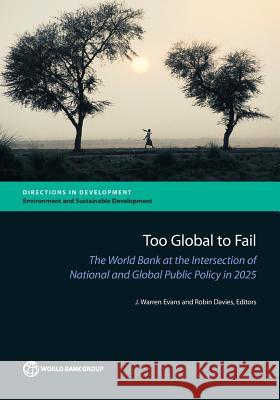Too Global to Fail: The World Bank at the Intersection of National and Global Public Policy in 2025 » książka
Too Global to Fail: The World Bank at the Intersection of National and Global Public Policy in 2025
ISBN-13: 9781464803079 / Angielski / Miękka / 2014 / 310 str.
Too Global to Fail: The World Bank at the Intersection of National and Global Public Policy in 2025
ISBN-13: 9781464803079 / Angielski / Miękka / 2014 / 310 str.
(netto: 176,88 VAT: 5%)
Najniższa cena z 30 dni: 182,87 zł
ok. 30 dni roboczych.
Darmowa dostawa!
Too Global to Fail: The World Bank at the Intersection of National and Global Public Policy in 2025 analyzes the issue of global public goods, particularly those related to the environment, in the context of the global development process. Long-term sustainability of development is at stake, as the distinction between developing and developed countries in their approaches to environmental issues is expected to continue for the foreseeable future. This study contends that global sustainability depends on and even consists of the provision of certain global public goods and that the prevailing approach to development assistance does not sufficiently recognize this fact. A key question is whether the country-ownership model is even compatible with global sustainability. A second key question is whether the political will exists to make the provision of global public goods an explicit and central objective of official development assistance. A third key question concerns the mobilization and use of resources for the World Bank's work to support the provision of global public goods. The World Bank is a major player on many regional and global issues, but its work at these levels is usually enabled by donor contributions, most often in the form of grants targeted at narrow, particular purposes. The editors of Too Global to Fail believe that international development assistance needs to undergo a major transition in order to take as one of its explicit and principal objectives the provision of global public goods important for development. The World Bank can play a leadership role in this transition, working within new kinds of coalitions but not abandoning the fundamentals of its operating model. The World Bank can also play a unique role in stimulating the private provision of global public goods through risk sharing and market creation.











